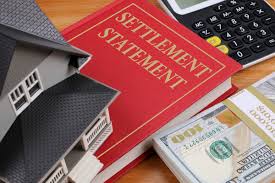You might, one way or the other, run into a settlement statement in the course of executing your loan. This is because it details all of the closing expenses and credits associated with real estate purchases or refinances. In this article, you will get to understand the difference between “settlement statement” and “uniform closing disclosure” in real estate (i.e., settlement statement vs. uniform closing disclosure), especially in places like Texas. Let’s get on to business.
Settlement Statement Real Estate
A settlement statement is a detailed description of all fees and credits associated with a real estate transaction. It serves as a record of how all of the funds have moved line by line, as well as the property’s selling price, loan amount, and other information.
The Consumer Financial Protection Bureau requires this statement, which replaces the previous HUD-1 statement (uniform settlement), giving a more efficient and less complex document as of 2015, while the HUD-1 is still useful in some real estate instances. The mortgage lender’s settlement agency, title firm, or real estate attorney can give the homebuyer and seller a settlement statement.
“A settlement statement tells the lender how much funds they need to bring to settlement to buy or refinance the property; it tells the seller how much money they’ll get from the sale,” Jana Paterson says. It lists the amounts payable to real estate agents who received commissions from the transaction, as well as taxes and recording fees owed to local governments and the last payments to the lender.
Who Prepares The Settlement Statement?
The settlement statement will be prepared by whoever is arranging the closing if it’s a title business, escrow company, or real estate attorney.
What Is The Purpose Of A Settlement Statement?
A settlement statement is useful in every real estate transaction. It’s useful in all-cash deals, reverse mortgages, commercial and investment property sales, as well as residential purchases and refinances. In most situations, you will get the settlement statement for real estate; at least three working days before the closing.
Types Of Settlement Statements
There are two types of settlement statement in real estate closing. They include:
#1. Closing Disclosure
The five-page closing disclosure is a completed copy of the loan estimation, the document you receive when you first apply for a mortgage that gives a glimpse of projected fees. Your mortgage lender must tell you this information at least three working days before the deal closes.
#2. HUD-1 Settlement Statement
According to Tatiyana Toutok, the HUD-1 is a two-to three-page document that is commonly utilized in all-cash transactions, commercial or investment property sales, or reverse mortgage circumstances. It’s similar to the closing disclosure in that it lists costs and credits. However, delivery must take place one day before the closing date. While both parties are available at closing, the statistics on this form can be altered, withdrawn, or added at the last minute. Lastly, this settlement is also known as a “uniform settlement statement” in real estate.
What Should I Look For In My Real Estate Settlement Statement Closing?
A settlement statement lists and organizes several items, including:
- Fee for a home inspection
- The contract price of the property
- Real estate tax and assessment allocation
- Fee for appraisal
- Real estate agent commissions
- Amount, interest rate, and terms of the loan
- Fees charged by lenders.
- Fee for title/escrow business
How Settlement Statements Work
All single real estate transactions in the United States are obliged by law to include settlement statement documents. This paperwork is utilized for both buying and remortgaging, as well as any cash or reverse mortgage deals, as well as commercial and investment property sales.
The issuing of a settlement statement is typically under three days before the official completion and closing of a real estate transaction to the sale and purchase parties.
What You Should Do When You Get Your Settlement Statement
When you get your closing disclosure or settlement statement, you know you’re getting close to completing your home purchase. Some homeowners receive the document by accident and toss it aside, assuming it contains the information they already know.
Sometimes it is advisable and important to ensure that you read every word of the paper and that all costs and information are correct. It’s even better to have a real estate attorney check over these documents.
Lastly, if you agree to all of the fees indicated on the statement, you will proceed to finalization and signing.
Settlement Statement Real Estate Closing
The Seller’s Closing Statement, also known as the Settlement Statement, is an organized summary of fees and credits that displays your net earnings as the seller and totals the contract’s finances. This is one of the seller’s several closing documents. This document contains anything from the transaction price to loan amounts, school taxes, and other crucial information.
Closing remarks may appear complex at first, but they’re rather easy. They give a detailed summary of which charges apply to certain parties. This helps both the buyer and the seller better understand how to calculate the final expenses during the selection and why each of you is responsible for various fees.
What Fees Would A Seller Pay?
#1. The Important Things
To close on a house sale, your mortgage must be paid in full. From a seller’s standpoint, this is the first major consideration. Another expense that both buyers and sellers may incur is their share of the real estate agent’s commission. Your seller’s disclosure statement would include this information. For the time you’re still living in the house, you might additionally pay your allocated property taxes or homeowners insurance.
#2. Inspection And Corrections
If the property requires any changes, you may be required to pay. Depending on the type of financing a buyer takes out, repairs may be required before the property can be sold. You and the buyer may have a comparable agreement in the purchase agreement for repairs that are discovered during the inspection. Work with a Realtor who has a sixth instinct for settlement concerns to avert problems.
In the settlement statement, a different record is created by either an attorney, a title business, or an escrow firm, according to which state you’re in, and the actual closing is held at one of these three locations.
#3. Seller Concessions
Then there are seller discounts, which are frequently in selection during buyer-seller talks. Paying for all or part of the title insurance, appraisal costs, or prepaid interest points will assist you to close the sale quickly and lock in a buyer.
Buyers will occasionally take advantage of seller concessions to reduce the amount they must bring to the closing table and roll their costs into the loan to be reimbursed over time. In this agreement, the seller offers to pay all or part of the closing fees in exchange for a greater sales price. Based on the buyer’s down payment, the amount a seller can pay toward these charges may be limited.
Closing Disclosure Form
The Consumer Financial Protection Bureau has required that buyers get the closing disclosure no earlier than three days before closing since the subprime mortgage crisis of the 2000s. It contains information on loan charges, as well as additional fees and information relevant to the borrower. If you volunteer to pay any of the buyer’s loan fees, you’ll almost certainly receive a copy of the closing disclosure, which lists the lender’s charges.
Failure to disclose this information within 3 days after the loan application is accepted and again 3 days before closing, might result in a penalty for the lender. Until a license disclosure is signed, only the buyer should be able to see it. Consult with a lender who can explain your closing disclosure to you because this is a vital closing document for you as the seller.
Is There A Closing Statement For The Seller?
The majority of the documentation is signed by the buyer at closing, leaving some sellers wondering whether they’ll obtain a settlement statement. This is one document, though, that is relevant to all parties to the contract. At closing, both the seller and the buyer will obtain a copy of the settlement statement to analyze.
Is There A Difference Between A Settlement Statement And A Closing Statement?
No there is no difference between the two terms. A settlement statement is the same as a closing statement, although the real estate market prefers to use the term “settlement.”
What Does The Closing Statement Of The Seller Look Like?
On one side, there is a section for the seller’s debits and credits, on the other, there is a section for the buyer’s debits and credits, and in the center, there is a summary of the charge. We’ll break down the ALTA form line by line in the sections below.
Settlement Statement vs Closing Disclosure: Differences
Although the closing disclosure offers nearly identical information to the settlement statement, it is tailored to the lender and their charges. The buyer’s lender issues the closing disclosure, which is meant to be matched to the loan estimate, which is the initial estimate of fees the buyer receives while borrowing money.
The closing disclosure is usually prepared using a copy of the expected settlement statement sent by the closing broker. If the end line sums in the closing presentation and settlement statements do not tally, something is seriously wrong.
The closing disclosure is usually not given to the seller. A closing disclosure is not required in a cash deal because no money is borrowed. However, the buyer and seller will receive a settlement record that summarizes their costs and any reimbursements.
What Is A Closing ‘Extra Deposit’?
The “Excess Deposit” is a component of the seller’s settlement statement that can be confusing. What is an excess deposit, and who is responsible for the monies on that line? In a nutshell, the excess deposit line indicates any monies remaining after real estate agent commission costs from the buyer’s earnest money deposit.
We will be looking over to the next topic which is; the difference between settlement statement real estate and closing disclosure (settlement statement real estate vs closing disclosure)
Settlement Statement Real Estate vs Closing Disclosure
To fully grasp the settlement statement real estate vs closing disclosure, we will first explain them one after the other. The HUD-1 settlement statement, vs a uniform closing disclosure in real estate, includes important information on the borrower’s loan, including the principal and interest, as well as all advance expenses, commission charges, service costs, and any deductions.
Settlement Statement Real Estate vs Closing Disclosure Definition: Closing Disclosure
A Closing Disclosure is a five-page document that contains final information regarding the mortgage loan you’ve chosen. A closing disclosure is all the detailed loan amount, interest rate, expected monthly mortgage payments, and closing costs. Lenders must provide house buyers their Closing Disclosure at least three business days before the loan closes.
Settlement Statement Real Estate vs Closing Disclosure Definition: Settlement Statement Real Estate
In settlement statement of real estate, it includes important information on the borrower’s loan, including the principal and interest, as well as all advance expenses, commission charges, service costs, and any deductions. In reading more on the contrast between settlement statement real estate vs closing disclosure, there are other things to consider, and they are:
Is A HUD Statement The Same As A Closing Disclosure In This Case?
Another significant difference between the closing disclosure and the HUD-1 (uniform statement of settlement) in real estate is that, whereas the HUD-1 states all terms, charges, and credits for both the buyer and the seller, the closing disclosure contains a specific form for both the buyer and the seller. This increases consumer security at the negotiating table.
Is A Closing Disclosure An Indication That I’ve Been Affirmed?
The closing disclosure will arrive at least three business days before the loan closes. This provides you with plenty of opportunities to compare the closing disclosure to your loan estimate. Don’t worry; having signed the form does not indicate that you agree to the loan.
The loan amount, interest rate, expected monthly mortgage payments, and closing costs are all detailed in the closing disclosure. Lenders must provide home buyers with their closing disclosure at least three business days before the loan closes.
The closing disclosure form is more simple than the HUD-1 settlement statement, which was extensive and complicated.
What Is The Purpose Of The Closing Disclosure Form?
The closing disclosure document is the final version of the loan estimate that you obtained when you enrolled for your mortgage. Although the Loan Estimate provides an analysis of the value you’ll pay for your mortgage, the closing disclosure form includes actual figures.
How To Make Sure Your Closing Disclosure Is Correct
You should verify your loan calculation with the closing disclosure document. The majority of the numbers and terms should be similar, but due to the weeks (or even months) that have passed since you adapted and your closing date, they may vary.
In contrast between settlement statement real estate vs closing disclosure, the lender should send a copy of the closing disclosure form to your agent. They can assist you in double-checking its accuracy. Start with this checklist, but keep in mind that it is merely a starting point:
- The spellings of your name
- Type of loan
- Rate of interest
- Loan duration
- Cash-to-Closure ratio
- Closing expenses
- Amount of loan
Uniform Settlement Statement Real Estate
The Uniform Settlement Statement (also known as the “HUD 1 form”) is the one form needed by the Real Estate Settlement Procedures Act (RESPA) that details all money collected, all payments made, all costs, and all credit at the conclusion in a property purchase.
An escrow business or escrow attorney usually prepares this form. It is usually delivered to the buyers at least 24 hours before the closing date, giving them time to evaluate and confirm it.
Both purchasers and sellers should keep the Uniform Settlement Statement with their critical records for the task of introducing their income tax returns after their real estate closures since some of the charges are tax-exempt for both parties.
The uniform settlement statement for real estate in Texas differs from other states in America; but all the same, we will be looking into the one of Texas.
Settlement Statement Real Estate Texas
Several attendees may be present at the conclusion to represent specific interests. While you, as the buyer, are required to be there to sign the contract and take possession of the property, Texas law stipulates that the seller does not need to be present. However, the following individuals are likely to attend:
- Closing agent: This individual facilitates the meeting and oversees the signing of documents, as well as the recording, payment, and distribution of the funds.
- Attorneys: Depending on whether the purchasers and lenders hire an attorney, one or both sides may be represented.
- Lender: If a loan has been taken out, the lender will make arrangements for the repayment of the debt.
- Title search company/escrow agent: The closing will most likely occur in the offices of your title insurance company, so anticipate seeing their representative.
- Realtor: Both yours and the seller’s agents may be present.
How Much Does The Settlement Statement In Texas Real Estate Closing Expenses Cost?
Although all the taxes, fees, lender charges, and insurance sums up, neither side usually pays the entire closing cost. Rather, the seller would normally pay between 5% and 10% of the retail price in closing charges, while the buyer will probably pay between 3% and 4%.
It’s worth noting, although, that even if you save the majority of closing charges, you’ll still have to pay for realtor commissions, which can total up to 6% of the sale price.
What Are The Costs Of The Settlement Statement In Texas For Both Parties In Real Estate?
While the buyer and seller usually split the closing costs, nothing is fixed in gold. As previously said, all closing fees are adjustable, so be aware of them all on the occasion that your buyer requests that you pay a percentage of their closing costs. We’ve listed some of the most common uniform settlement statement costs in Texas real estate, along with an estimate of how much they’ll cost.
Closing Settlement Statement Real Estate Costs For Texas Sellers:
#1. Real Estate Agent Commission
The commission paid by the real estate agent is normally 5–6 percent of the sales price: If you plan to use the services of a qualified realtor and the buyer does as well, you will be responsible for the following costs. This number varies significantly from one agent to the next, but in Texas, it is normally 2.5 percent to 3 percent. If you sell with a SimpleShowing agent for a 1% listing fee, you can save 2% on your closing costs.
#2. Outstanding Property Debts
You’ll be responsible for any outstanding payments on your house, such as homeowner’s association fees and living costs. All of these extra charges will be allocated to the date of your closing.
#3. Settlement Fee
While you can avoid paying legal costs (Texas does not require an attorney to be present at closing), you will still have to pay a settlement fee to the title company or escrow firm for their services on closing day.
#4. Municipal Lien Search
A municipal debt search looks at unregistered property concerns that aren’t revealed by a standard title search, such as non-compliance, water/sewer/solid waste balances, and open or lapsed permits, to mention a few. The price varies depending on the locality.
#5. Title Search
A title search costs between $100 and $200 and verifies that you are the legal owner of the property and that the title is free of liens or judgments.
Settlement Statement Closing Costs For Texas Buyers In Real Estate
#1. Loan Origination Fees
Optional loan origination costs range from 0.5 percent to 1.5 percent of the sales price: These expenses cover any loan fees, such as application fees, prepayment interest, and loan origination fees. While a loan is not required, these will be present if the home is purchased with a mortgage.
#2. Appraisal
An appraisal establishes the value of a home for the lender to be certain that the property is worth the money the lender is lending to the buyer. The appraisal is frequently paid in advance by credit card and hence is not required at the time of closing.
#3. Survey
A survey of the land will be required by many lenders to determine the location of any buildings and the property’s borders. Costs differ based on the land and the kind of property.
#4. Credit Report
This fee covers the lender’s cost of pulling the buyer’s credit record and result.
#5. Home Inspection
A home inspection, performed before closing, will identify any severe issues with a home, such as structural or fundamental damage. Costs vary by organization and location; for example, a home inspection in Dallas could cost $320.
#6. Fees For Recording
This charge covers the expense of registering your property’s sale and transfer. The deed of transfer will become part of the public record once it is recorded.
Should You Foot The Bill For The Buyer’s Closing Costs?
While it may appear paradoxical to contemplate paying for the buyer’s closing costs, assisting the buyer can profit you. You can also help ensure the purchase of your house goes smoothly by paying for the buyer’s closing fees, or even a part of them. Buyers are responsible for the majority of the costs in a settlement statement real estate transaction, from the down payment and mortgage payments to property taxes and homeowner’s insurance.
Lastly, funding for a portion of the buyer’s closing costs might ease financial stress and offer enough cash reserve for the buyer to sign the contract.
Keys For Texas Settlement Statement In Real Estate (Home Sellers)
It’s critical for homeowners to understand that selling their property will almost certainly cost more than they expected. You, as a homeowner, will be responsible for commission fees, possible repair charges, staging, and curb appeal costs, among other things.
To assist you to manage all of your selling costs, you should speak with a knowledgeable real estate agent who can advise you on the best way to sell your house for the best price.
What Is Included in the Settlement Statement?
A settlement statement is a detailed description of all fees and credits associated with a real estate transaction.
What Is the Primary Purpose of the Settlement Statement?
It keeps track of how all of the funds have moved line by line, as well as the property’s selling price, loan amount, and other information.
Is Settlement Statement Same as Closing Disclosure?
Another significant difference between the Closing Disclosure and the HUD-1 is that, while the HUD-1 states all terms, charges, and credits for both the buyer and the seller, the Closing Disclosure contains a specific form for both the buyer and the seller.
What Is a Closing Disclosure Statement?
The closing disclosure statement contains information on loan charges, as well as additional fees and information relevant to the borrower.
What Is a Good Closing Statement?
Summarize the evidence and its relationship to the law – Refer to the evidence you offered before the court, such as witness testimony and supporting papers, to demonstrate the arguments you are attempting to prove. Address the other party’s arguments; if you can demonstrate that their points do not apply to you, do so.
What Are the 4 Steps in the Closing Process?
The 4 steps in the closing process are:
- Close revenue accounts to Income Summary.
- Close expense accounts to Income Summary.
- Close Income Summary to Retained Earnings.
- Close dividends to Retained Earnings.
How Long Should Closing Statement Be?
Typically, each concluding argument lasts 20 to 60 minutes. Some governments restrict the length of the closing, while others let a portion of the time to be saved for a later date.
Related Articles
- I NEED TO BUY A HOUSE: Best Easy Guide On Buying A House In 2023
- CLOSING AGENT: Salary, Job Description & How to Become an Agent (Detailed Guide)
- 6 Tips to Close More Mortgage Loans
- REMOTE CLOSING: Step By Step Guide On Buying a Home Online
- Closing Statement: Definition and Tips for Writing Effective Statement
- How To Secure Your Online Business From Cyber Threats?






